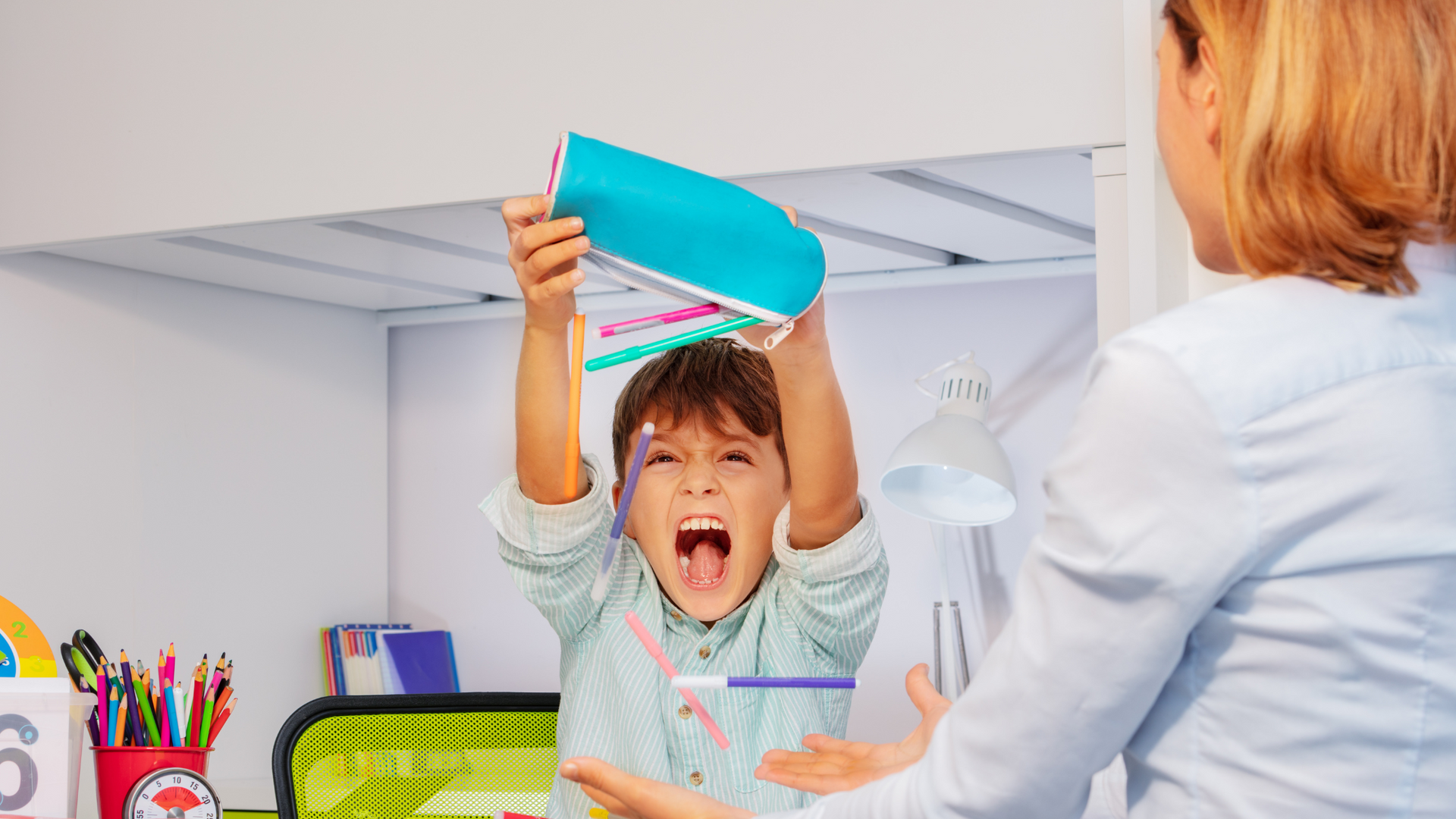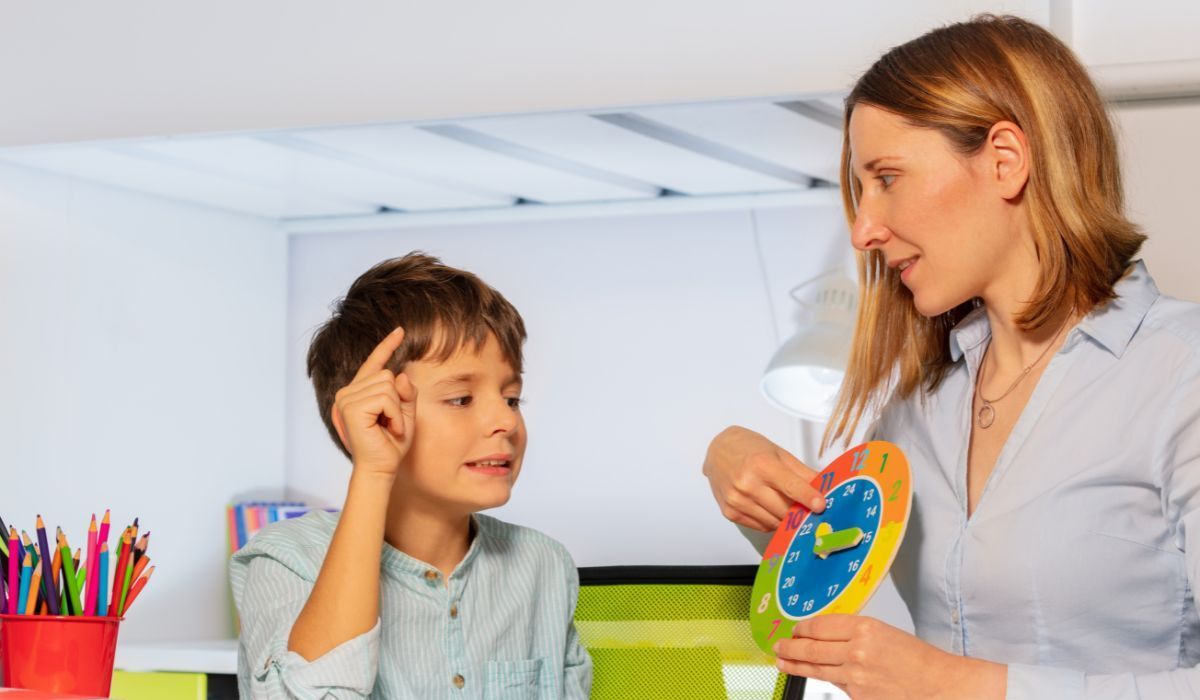How ABA Prepares Kids for the Structure of School
Reece Epstein • July 19, 2025
Preparing Kids for School with ABA Therapy

Starting school is a major transition for every child. It introduces new routines, expectations, and social environments that can sometimes feel overwhelming. For children with developmental differences, these challenges can be even greater, making the adjustment to school life a critical step requiring careful support. Applied Behavior Analysis (ABA) therapy has become a trusted, effective approach for preparing children to meet the demands of school with confidence.
Families across Maryland seeking ABA autism therapy Maryland, ABA home therapy Maryland, and services from dedicated ABA companies Maryland often turn to personalized ABA programs to ensure their children develop the skills needed to succeed academically, socially, and emotionally. At Able
Minds ABA, we specialize in providing comprehensive, tailored services that bridge the gap between therapy and school readiness.
Understanding the Structured Environment of School
School operates on a framework of structured routines and clear expectations designed to foster learning and social development. From the moment children arrive, they experience a day governed by schedules, transitions, rules, and peer interactions. This structure helps create an environment where learning can happen efficiently and safely.
However, for many children with developmental challenges, this structure can be confusing or stressful. The requirement to transition quickly between activities, follow multi-step instructions, and interact with peers in socially appropriate ways can be daunting. Without effective preparation, children may become overwhelmed, leading to frustration and behaviors that interfere with their learning and social experiences.
ABA therapy addresses these challenges by breaking down the components of school life into manageable skills. It helps children understand what to expect and how to respond in ways that encourage success and reduce anxiety.
How ABA Supports Children in Navigating School Structure
Applied Behavior Analysis is a research-based approach focused on teaching functional skills through positive reinforcement and data-driven techniques. The goal is to help children acquire the abilities needed to operate effectively within structured environments like school.
Here are some ways ABA prepares children for the structure of school:
Teaching Predictable Routines and Transitions
Schools operate on consistent daily schedules that guide students through their day. For children unaccustomed to these routines, the transitions between activities—such as moving from playtime to classwork or from lunch to recess—can be confusing.
ABA therapists use tools like visual schedules, timers, and clear verbal cues to help children anticipate and prepare for transitions. These strategies reduce uncertainty and provide children with a sense of control, which in turn lowers stress and minimizes disruptive behaviors. Through repeated practice, children learn to move smoothly between activities, an essential skill for thriving in school.
Building Communication Skills
Effective communication is central to school success. Children must be able to request help, participate in classroom discussions, and express their needs and feelings appropriately. ABA therapy targets communication skills tailored to each child's current abilities, whether through verbal language, gestures, or assistive communication tools.
Developing these skills not only supports academic engagement but also fosters positive social interactions with teachers and peers. When children can communicate effectively, they experience less frustration and are better able to focus on learning.
Encouraging Social Interaction
Social expectations in school are complex. Children need to navigate sharing, turn-taking, cooperative play, and understanding social cues. ABA therapy teaches these social behaviors in a systematic way, using role-playing, modeling, and reinforcement to build social competence.
Therapists guide children in practicing these skills within therapy sessions and real-life situations, helping them generalize what they learn to school and community settings. This preparation improves peer relationships and enhances the child’s overall school experience.
Promoting Focus and Task Completion
The classroom requires children to attend to tasks for extended periods and complete assignments within time limits. Many children find maintaining focus challenging. ABA techniques break tasks into smaller, achievable steps and use motivational strategies to encourage sustained attention.
By increasing the child’s ability to engage in structured tasks, ABA therapy lays the foundation for academic success and positive classroom behavior.
Managing Changes and New Experiences
The school environment can present new sensory and emotional experiences that may be unfamiliar or uncomfortable. ABA therapy teaches children strategies to cope with changes and manage reactions to new situations. Skills such as deep breathing, requesting breaks, or using calming techniques empower children to navigate the school day with greater ease.
The Advantage of In-Home ABA Therapy in Maryland
For families preparing children for school, ABA home therapy Maryland provides a significant advantage. In-home sessions allow children to practice school readiness skills in the comfort and familiarity of their own home. This setting reduces anxiety and offers natural opportunities for skill-building.
At Able Minds ABA, our therapists work closely with families during in-home therapy to integrate school-related skills into daily routines—such as morning preparation, following schedules, and practicing social interactions. This real-world application promotes generalization of skills, making it more likely that children will successfully transfer these abilities to the school setting.
In-home therapy also fosters strong family involvement. Parents and caregivers receive training and coaching, equipping them with tools to reinforce progress consistently outside of therapy hours. This collaborative approach enhances the effectiveness of ABA and supports sustainable outcomes.
Collaborating with Schools for Seamless Transitions
Successful integration into school often requires collaboration between ABA providers, families, and educators.
Therapists may assist families in developing or refining Individualized Education Plans (IEPs) and consult with teachers to share effective strategies for supporting the child’s learning and behavior. This teamwork ensures that children experience continuity in expectations and interventions, reducing confusion and promoting steady progress.
Why Early Intervention Matters
Starting ABA therapy early in a child’s development sets the stage for a smoother transition into school. Early intervention builds foundational skills, reduces behavioral challenges, and promotes greater independence.
Families who seek out ABA autism therapy Maryland services for their young children often find that early, consistent support leads to better long-term outcomes in school performance and social engagement. Early therapy also gives families the resources and confidence to advocate effectively for their children within the education system.
Choosing the Right ABA Provider in Maryland
Selecting a provider is a crucial decision for families preparing their children for school. When searching for ABA autism therapy, ABA providers Maryland, or ABA home therapy near me, consider the following:
- The provider’s experience with school readiness programs
- Credentials and certification of therapists
- Availability of in-home and flexible therapy options
- Family-centered approaches that include parent training
- Commitment to measurable progress and transparent communication
Able Minds ABA is proud to meet these standards. Our team of dedicated professionals is focused on delivering individualized therapy that supports children’s successful entry into school and ongoing academic achievement.
Supporting School Preparation at Home
Families can complement ABA therapy by reinforcing skills at home. Establishing predictable routines similar to the school day, using visual aids like schedules and timers, and encouraging social play are effective strategies.
Positive reinforcement for following routines, completing tasks, and using communication skills helps build confidence. Celebrating small achievements motivates children and fosters a positive attitude towards school.
The Long-Term Impact of ABA on School Success
ABA therapy’s structured, data-driven approach builds a solid foundation for lifelong learning. By equipping children with the skills to navigate school’s structure, ABA fosters not only academic success but also social and emotional growth.
Children who receive effective ABA therapy tend to experience less frustration, greater independence, and increased engagement in school activities. These benefits contribute to better educational outcomes and an improved quality of life for children and their families.
Conclusion: Building Confidence for the School Years Ahead
The transition into school is a complex step for children who require additional support. Applied Behavior Analysis therapy offers a comprehensive, individualized path to prepare children for the structure and expectations they will encounter.
For families in Maryland seeking trusted, compassionate support, Able Minds ABA offers personalized ABA therapy programs—including in-home options—that help children develop essential skills for school readiness. Through early intervention, family collaboration, and expert guidance, ABA empowers children to approach school with confidence and the tools they need to thrive.
By focusing on communication, social skills, routine compliance, and coping strategies, ABA therapy opens the door to a positive school experience and a brighter educational future.
FAQs
How does ABA therapy help children adjust to school routines?
ABA therapy breaks down school routines into smaller, manageable steps, teaching children to follow schedules and transition smoothly between activities. Visual supports like picture schedules and timers are often used to help children anticipate changes and reduce anxiety. This approach helps children adapt confidently to the structured environment of school.
Can ABA therapy improve my child’s communication skills for the classroom?
Yes, ABA therapy targets communication by teaching children how to express their needs, ask for help, and engage in classroom interactions. Whether through speech, gestures, or assistive devices, these skills reduce frustration and promote independence, enabling children to participate more fully in their learning environment.
What role does in-home ABA therapy play in school preparation?
In-home ABA therapy allows children to practice school readiness skills in a familiar setting, reducing anxiety and enhancing generalization of those skills. It also involves parents as active partners, equipping families to reinforce learning consistently throughout the day, which supports smoother transitions to school.
How do ABA providers collaborate with schools to support children?
Many ABA providers work closely with educators and families to align therapy goals with educational plans, such as IEPs. This collaboration ensures consistency in strategies and supports across home and school environments, helping children succeed both academically and socially.
When should my child start ABA therapy to prepare for school?
Early intervention is highly recommended as it builds foundational skills that support better adaptation to school structure. Beginning ABA therapy early increases the likelihood of improved communication, social skills, and independence, setting the stage for long-term success in the classroom.
How can families support ABA therapy goals at home?
Families can reinforce ABA goals by establishing consistent daily routines, using visual schedules, and encouraging social interaction at home. Positive reinforcement for following routines and practicing communication boosts confidence and helps children generalize skills learned during therapy to real-life situations.

Choosing the right ABA therapy provider is a crucial step toward helping your child achieve greater independence, improved communication, and better social skills. In Maryland, families are fortunate to have a growing number of options for applied behavior analysis therapy , but with so many choices, it can be overwhelming to know where to begin. Whether your child has just received a diagnosis or you’re transitioning between providers, selecting the best fit means looking beyond the surface. The right provider offers not just therapy sessions—but compassionate care, individualized plans, and a team committed to your child’s long-term success. What Is Applied Behavior Analysis (ABA) Therapy? Applied behavior analysis therapy is a science-backed intervention that focuses on understanding and improving behaviors. It’s particularly effective for children who face developmental and behavioral challenges, such as autism. ABA breaks down complex skills into manageable steps and uses positive reinforcement to help children master those skills. A certified applied behavior analyst therapist develops personalized programs tailored to each child's strengths, challenges, and goals. Over time, ABA can help build critical life skills such as communication, emotional regulation, cooperation, and self-help. Why Finding the Right ABA Provider in Maryland Matters Not all ABA therapy providers offer the same level of care. In a state like Maryland—with diverse communities from Baltimore to Silver Spring to Annapolis—parents must carefully evaluate local providers based on their approach, credentials, and experience. Choosing the right partner for your child’s development ensures: Faster progress through tailored interventions Stronger collaboration between family and therapists Better preparation for school and social life Whether you're seeking applied behavioral analysis Maryland services in-home or in-clinic, quality and fit matter. Step-by-Step Guide to Choosing the Best ABA Therapy Provider in Maryland 1. Confirm Credentials and Certification The most reputable ABA therapy providers in Maryland are staffed with: Board Certified Behavior Analysts (BCBAs) – who design and oversee your child’s treatment Registered Behavior Technicians (RBTs) – who implement the therapy under BCBA supervision Always verify the provider is licensed to deliver applied behavior analysis therapy in Maryland. Check credentials through: Behavior Analyst Certification Board (BACB) Maryland Department of Health 2. Ask About Treatment Philosophy No two children are alike. That’s why effective ABA therapy is never “cookie-cutter.” Look for providers who: Conduct detailed initial assessments Develop individualized treatment plans Use data to guide decisions Adjust strategies as your child grows The best applied behavior analyst therapists focus on creating measurable, achievable goals tailored to your child’s unique needs. 3. Explore the Service Delivery Options Depending on your child’s needs and your lifestyle, you may prefer: In-home ABA therapy : Delivered in the comfort of your home for real-life skill-building Clinic-based ABA therapy : Offers structured learning environments and peer interaction School-based support : Collaborates with educators to reinforce skills during school hours Telehealth : Ideal for remote or flexible support Ask if the provider supports families throughout the state or in specific regions (e.g., Montgomery County, Prince George’s County, or Baltimore City). 4. Check Insurance Coverage and Billing Transparency Therapy can be costly, but the right provider will help you navigate: Maryland Medicaid and private insurance plans Out-of-pocket cost estimates Prior authorizations Payment plans or financial assistance A high-quality provider will also assign a care coordinator to support you with insurance paperwork and communication. 5. Learn About Staff Training and Retention Children thrive on consistency. A reliable provider invests in: Ongoing staff training Low staff turnover Regular BCBA supervision of RBTs Therapeutic consistency (same therapist assigned regularly) A committed and experienced applied behavior analyst therapist can form a meaningful bond with your child and deliver more effective results. 6. Understand Family Involvement You are an essential part of your child’s therapeutic journey. The best ABA providers offer: Weekly parent training and coaching Opportunities to observe sessions or review data Monthly progress meetings Tools to continue behavior strategies at home Providers who embrace family-centered care lead to stronger outcomes and smoother integration of skills into daily life. 7. Ask for Success Stories and References Don’t hesitate to ask: How many families they’ve served in Maryland Testimonials or references from current clients Case examples (anonymized) that match your child’s challenges Reading Google reviews, Facebook feedback, and local parenting forums can also give insight into the provider’s reputation in your community. 8. Visit the Facility or Schedule a Virtual Tour Seeing the environment where your child will receive therapy is invaluable. While there: Observe how therapists interact with children Look for clean, safe, and well-equipped spaces Ask about the ratio of children to therapists For in-home aba therapy, ask what materials and resources the therapist will bring and how sessions are structured. 9. Evaluate Their Communication and Responsiveness Strong communication is key. Your provider should: Respond promptly to inquiries Clearly explain the assessment process and therapy goals Be transparent about timelines, policies, and staff You should feel supported—not rushed—through the intake and onboarding process. 10. Trust Your Instincts Ultimately, choosing an ABA therapy provider is a personal decision. If you feel that a provider listens to your concerns, understands your goals, and truly cares about your child’s progress, that’s a strong sign you’re in the right place. Leading Providers Offering Applied Behavioral Analysis in Maryland Some trusted names to begin your search include: Able Minds ABA – A provider offering applied behavior analysis therapy across Maryland with flexible in-home services and experienced clinicians. Behavioral Framework Verbal Beginnings Key Connections ABA Services Each of these organizations provides certified applied behavior analyst therapists and offers individualized programs designed for success. Final Thoughts Choosing the best ABA therapy provider in Maryland doesn’t have to feel overwhelming. When you understand what to look for—from credentials and personalized care to communication and insurance support—you can find a team that fits your family’s needs and empowers your child to thrive. By investing in quality applied behavioral analysis Maryland services, you’re laying the foundation for a brighter, more independent future for your child.









